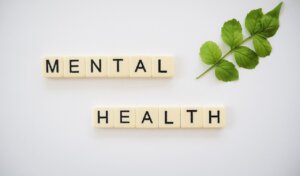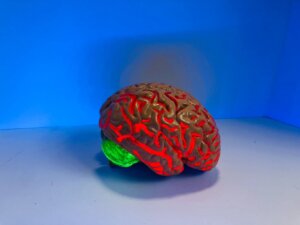We are pleased to bring you this guest post from one of our favorite contributors: Sara Popovich
When we decide to make better food choices, our motivation is usually our physical appearance and health. However, there’s another thing diet changes can have a surprisingly large impact on – our mental health.
Many people who change their diet, including myself, notice that it consequently changes how they feel. It leads us to being more energetic, happier, and concentrated. These mental changes are usually a consequence – rather than motivation for making a change.
However, if you are struggling with anxiety and depression, your motivation for losing weight can come from wrong reasons, particularly if you have low self-esteem. On the other hand, you can change the perspective, and make food choices that will boost your confidence and happiness. Healthy eating then becomes a form of self-care, rather than something we do out of insecurity.

How Food Impacts Your Mental Health?
A growing body of research investigates the complex relationship of nutrition and mental health. We are only beginning to understand the connection, which ancient practices like Ayurveda seemed to understand centuries ago.

Luckily, this topic is starting to be researched from a variety of angles, and we now have modern evidence that food can indeed influence our current mood, but also prevent and cease development of mental illness.
As I mentioned, the reason for this is complex. All the secrets lie in our gut…
One of the key factors in this relationship is serotonin, a neurotransmitter often dubbed the “happy hormone”. Serotonin is crucial for mood management, and most of it is produced in our gastrointestinal tract.

Healthy nerve cells in the gut produce healthy levels of serotonin, and to do that they require the “good” bacteria. These bacteria protect the cells and our intestines from bad bacteria, minimize inflammation and improve your absorption of nutrients.
Finally, good bacteria activate the pathways that directly connect the gut and the brain. This connection is crucial to understand if you want to learn how the food you eat impacts your emotions and energy.
The Brain – Gut Connection
Modern medicine compartmentalizes our bodies into sections. That’s useful in better understanding each system in our bodies. However, all parts of our bodies are connected, and we cannot fully understand any system when isolated. That’s especially true for the brain – gut connection.

This connection are actually the sympathetic and parasympathetic nervous systems, which send signals from the brain to the digestive system. These inputs affect how fast the food you eat moves through the digestive tract, how well you absorb nutrients and also the inflammation in the digestive system. Some recent research begun relating inflammation with depression, further fortifying the importance of brain-to-gut connection for mental health.

Depression, sadness, fear and anger can all impact the speed of the movements in the GI tract. These strong emotions can also make the digestive system more sensitive, increase inflammation and even change the gut microbiota – the bacteria that live in the gut. After a long negative period, our emotions can even worsen digestive illnesses including irritable bowl syndrome as well as food allergies.

It’s important to understand this connection is strong – and goes both ways. When GI is inflamed or troubled in any way, it will send signals back to the brain. Therefore, anxiety, stress and other mental health issues can be both a cause or effect of stomach issues.
Nutrients And Mood
The intimate connection and “conversation” between the brain and the gut are crucial to understand the impact of food on our mental health. The close second factor for this phenomenon are the actual nutrients we ingest.
Our brain works best when it gets the best fuel. A brain that consistently has access to nutrients found in whole foods will be able to operate better than the one in deficiency that comes with a diet high in processed foods. Food choices and nutrients impact all functions in the brain, and your mood.

Though a well-balanced diet is crucial for our general health, some nutrients have a higher effect on our mental health. Ensuring you are never deficient in these nutrients won’t heal a mental illness, but they will help you manage your emotions, mood and stress better.
Here are some nutrients found to be particularly important for mental health:
- Omega-3 Fatty Acids play an important role in brain development and sufficient intake has been linked to lower risk of depression. You can find them in fish, nuts and seeds.
- Magnesium has been linked to improved sleep and consequently, decreased anxiety. To get enough magnesium, increase your intake of whole grains and legumes, and nuts.
- Probiotics support the good bacteria in your gut and increase the levels of serotonin, the “happiness hormone”. Try adding more fermented foods, like yogurt, kombucha, and kimchi.
- Folate is a type of B vitamin needed for synthesis of our neurotransmitters and has a direct impact on sleep and mood. Deficiencies have been linked to depression. It can be found in leafy vegetables and citrus fruits.
- Vitamin D deficiencies have also been linked to higher risk of depression, and besides whole foods the best way to get more – is to spend more time in the sun.
- Vitamin C was found to have a therapeutic effect on depression, schizophrenia, anxiety, and other mental health conditions. One lemon contains enough of this vitamin for the entire day – and so do many other citrus fruits.
- Phytonutrients, both those found in high levels in berries, and flavonoids found in chocolate decrease inflammation. High inflammation is directly linked to depression.

What about diets? Is there a perfect diet for mental health?
I decided to research the topic of this article after I saw the impact the diet changes I made had on my mood. Although it was not my motivation, better mood was the largest change I noticed.
Personally, I switched to a mainly “alkaline diet”, which includes two things – eating food with a low PH level and minimizing meat and dairy.
The first factor, or alkalizing foods and their impact on mental health, was researched by an array of studies, the most notable one being the one published in the British Journal of Psychiatry. This study, unsurprisingly, revealed that those who mainly eat low PH foods, like vegetables and fruit, had a lower risk of depression when compared to those whose diet mainly consists of acid-forming foods, including meat and processed food. This study compared data from 3500 people, and the results were consistent.

On the other hand, I was also wondering whether me going mainly plant-based was the principal cause for the significantly improved mood and energy. Though I am not 100% vegan, I know that many of those switch to a vegan diet often report they feel more content.
However, I was quite surprised to see that the mainly referenced study comparing vegans and meat-eaters and their mental health found that vegans and vegetarians are more likely to develop depression and anxiety.

The researchers explained that this result naturally isn’t caused by a higher intake of plant food, rather common nutrient deficiencies which can lead to mental illness. These are particular nutrients that are present in much lower quantities in plants than in animal products and include vitamin B-12, folate, Omega-3 fatty acids and amino acids. Deficiencies of these nutrients are consistently linked to poor mood, lower energy and depression. Therefore, if one eats a well-balanced vegan diet with all necessary nutrients, they should not struggle with mental health issues solely for stopping eating meat alone.
Still, veganism is rarely proposed as the best diet for mental health. Given all the previous information, I was not surprised that the diet experts most often use for aiding mental health is the Mediterranean diet.

Several studies saw that those who follow Mediterranean diet have seen less chance for depression as well as improved symptoms if they already were depressed.
The main reason for such success of the Mediterranean diet is that it’s rich with omega 3s found in fatty fish and olive oil. Additionally, the diet is packed with fresh fruits, vegetables and legumes.
This information is great news for foodies – the Mediterranean diet is delicious, and the changes are easy to make as they’re not too restrictive. “Bad” foods like sweets or white bread are not completely eliminated, rather only reduced to a level that’s easy to implement long term.
Small Changes Lead To Long Term Improvement
With all this new knowledge in mind, I believe one shouldn’t put additional strain on their mental health by picking a strict diet, rather make small changes that will help them in a long run. Foods aren’t a quick-acting pill – they can make you happier, but not instantly.
Here are some specific small changes you can make to begin eating for a happier mind – but also things to avoid. Focus on one or two things you can change. Only after those become a habit, begin making other changes that feel right for you – and you have a recipe for long term success.

What To Do When Eating For Improved Mental Health:
- Eat a variety of foods to receive all the nutrients
- Don’t forget to include omega-3 rich foods, particularly if you’re plant-based
- Eat more whole foods which don’t contain additives or preservatives to keep your gut healthy
- Drink plenty of water to help your digestive tract
- Add probiotic-rich food if you struggle with digestive issues
- Eat throughout the day in set intervals to avoid blood sugar spikes
- Add more whole grains and legumes in your diet, for healthy fiber and protein
What To Avoid When Eating For Mental Health:
- Don’t skip meals, as this can lower your blood sugar levels to a point you where you feel chronically tired
- Don’t abruptly stop eating an entire food group, do it gradually to ensure you are getting all nutrients you need
- Avoid refined carbohydrates, as their high intake disrupts blood sugar levels and can make you lethargic and irritable
- Minimize sugar and caffeine, as they can trigger anxiety
- Minimize high-fat dairy, fried and refined foods, as these don’t only hurt you physically but significantly increase risk of depression

Conclusion
The relationship of the food we eat and our mental health is complex. The reason why “things work the way they work” is still not completely understood. However, it is obvious that eating healthier doesn’t only restore your physical but also your mental health.
The great thing about it, is that the diet changes we should make for improved energy and mood are the same ones we would make for a healthier body. No restrictive diet is necessary, simply a higher intake of whole foods, variety of nutrients and a minimized intake of sugar and processed food.

Improved diet is still not the only treatment for mental illness, but a useful addition to traditional methods and therapy. This article will help you to start on the right track, but one of the best things you can do is to become conscious of how different food types impact you personally. We don’t all respond to the same things the same, so experiment and learn how you can make use of food as an additional therapy for more emotional stability and a joyful life.
Sara Popovic is a freelance writer, who was first introduced to yoga as a teen. Except for yoga, she also enjoys writing about fitness, beauty and well-being. When she’s not writing, she’s working out, reading and spending time in nature with their dog.
Contact Sara at saras.content@gmail.com and https://www.fiverr.com/sarascontent
Featured Image courtesy of Jerzy Górecki from Pixabay


I love reading posts written by Sara. She really knows how to connect with those of us who are trying to learn about all of this. I really had no idea how big of an impact food has on our mental health. It makes sense though. Definitely going to try and eat a Mediterranean diet! There is so much more I want to learn about what I have just read. I hope to see more! Thank you!
Tammy
I want to express my passion for your kindness supporting people who have the need for guidance on this important theme. Your real commitment to getting the message all-around had become definitely important and has truly permitted regular people much like me to get to their targets. Your informative useful information implies so much to me and substantially more to my fellow workers. Thanks a ton; from each one of us! And my mom!